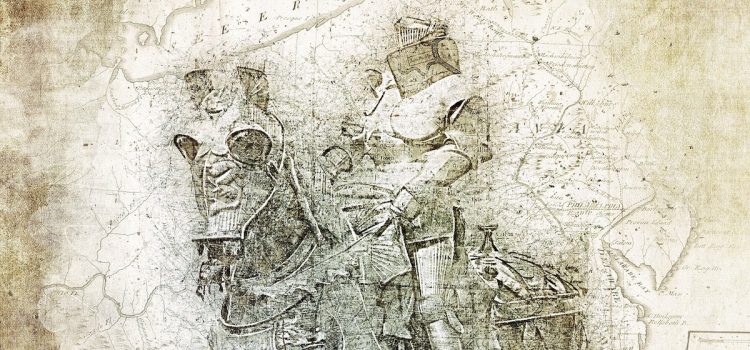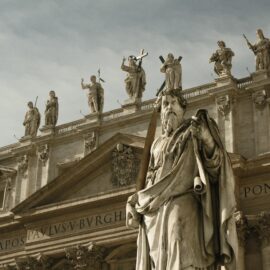

This article is an excerpt from the Shortform book guide to "The Silk Roads" by Peter Frankopan. Shortform has the world's best summaries and analyses of books you should be reading.
Like this article? Sign up for a free trial here.
What were the Crusades about? What impact did they have on the world?
Muslim conquests in Asia, Africa, and Europe—and threats of further conquests—sounded the alarm for the Christian Byzantine Empire. The emperor asked Western European Catholics for help. The resulting Crusades would shape the world in ways that we see still today.
Keep reading to learn about the impact of the Crusades.
What Were the Crusades About?
What were the Crusades about? We have to go back in time to see what led to this epic struggle. In the early seventh century, Muhammad’s armies conquered the overextended and weakened Persian state and seized North Africa, the Iberian Peninsula, and the Balkans. They founded Islamic states—known as caliphates—in the wake of his conquests, starting with the Rashidun Caliphate (632-661) and the Umayyad Caliphate (661-750).
As Peter Frankopan writes, the success of the Muslim conquests and the subsequent rise of powerful Muslim states threatened the Christian Byzantine Empire (the successor to the old Roman Empire in the East) as Muslim armies began to make incursions on Byzantine territory. In 1099, the Byzantine emperor, via the pope, appealed to the Catholic Christians of Western Europe for aid.
This was the beginning of the Crusades—the centuries-long religious struggle waged by European Christians against the Muslim states of the Middle East for control of the Holy Land (the name Christians gave to the area generally corresponding to modern-day Israel and Palestine, where Jesus Christ lived and taught). The Crusades were undoubtedly a period of violence and savagery, writes Frankopan, but the positive impact of the Crusades also should be noted, as they marked the dawning of a new era of cultural and economic connections between East and West.
The Impact of the Crusades
Thanks to the conquests of the Crusaders, Frankopan argues, Europeans gained new access to the rich markets and trade routes of the East, and European scholars marveled at the scientific, literary, theological, and cultural achievements of the Muslim world.
The Crusades would leave a lasting impact on Europe. By integrating Europe deeper into the cosmopolitan trading networks of the East, the Crusades brought new wealth and revenue to European monarchs, helping to finance the establishment of powerful, centralized kingdoms like England and France (supplanting the local feudal lords and landed nobility that had hitherto dominated European politics and hindered the formation of centralized states).
Moreover, the Crusades shook Western Europe out of the isolation in which it had languished since the fall of the Western Roman Empire and gave the new, rising monarchs wider ambitions about their role in the world. Thus, writes Frankopan, the Crusades helped lay the groundwork for the European global imperialism that would follow in the centuries to come.
| The Crusades and the Idea of the West Other scholars’ work supports Frankopan’s idea of the Crusades as a watershed moment for the development of European self-identity. In Orientalism, Edward Said writes that the Crusades followed an ancient cultural tradition of Western encounters with the so-called “Orient” that reinforced Europeans’ ideas of the East as a strange, exotic land of “otherness.” Indeed, he writes, the very separateness of the Orient was a key element in forging the emerging “Western” or “European” identity. Said writes that, in the wake of the Crusades, Islam became the great existential menace of Christian Europe, threatening the frontiers of Europe while occupying the Christian holy sites of the Levant. For the next millennium, until the fall of the Ottoman Empire after World War I, Islam would occupy a singular role in the European mind as the only plausible threat to European Christian hegemony. Said argues that Europeans saw Islam as a bastardization or perversion of the true religion of Christianity, with the prophet Muhammad as the fraudulent Muslim analogue to Christ—to Europeans, Said writes, the “Oriental” mind was only capable of producing an inferior facsimile of the superior Western original. |

———End of Preview———
Like what you just read? Read the rest of the world's best book summary and analysis of Peter Frankopan's "The Silk Roads" at Shortform.
Here's what you'll find in our full The Silk Roads summary:
- Why the Silk Roads have always been history’s crucial connection point
- Why understanding the East is crucial to our understanding of the world
- A history of the Silk Roads, from ancient times to the 21st century






